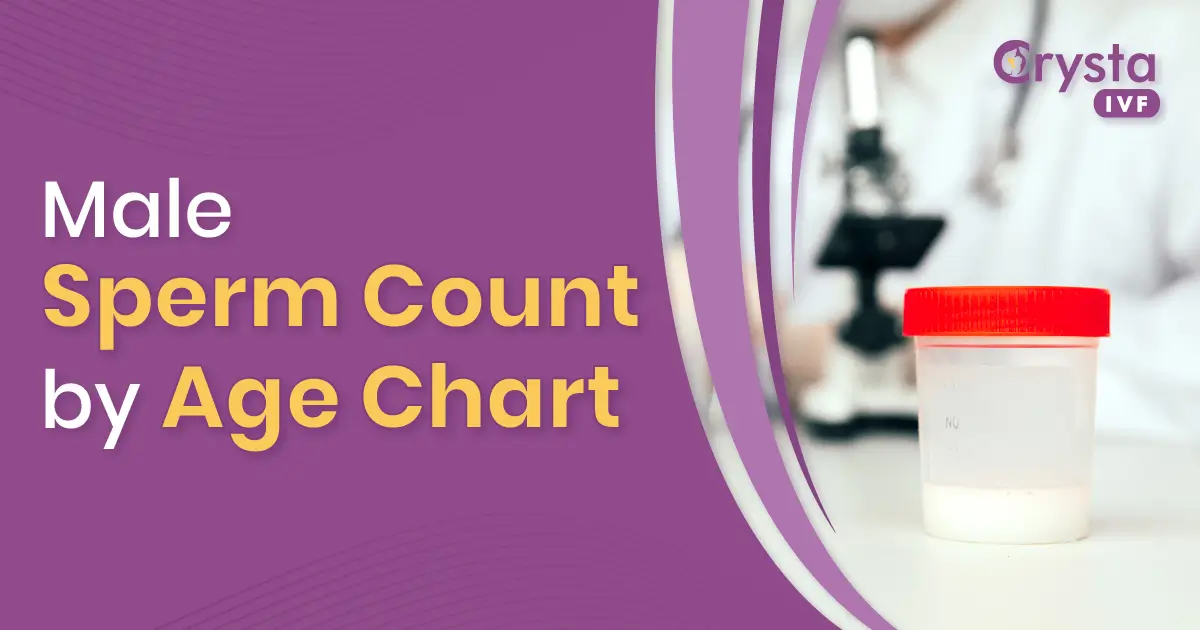If couples have been trying to conceive for over two years without success, they may be facing infertility issues. Often, women are considered responsible when a couple cannot conceive, but did you know that male sperm count can also be a factor?
Having an appropriate sperm count is crucial when trying to get pregnant. This blog will discuss the importance of having a normal male sperm count by age.
Book a Consultation Now at Our IVF Clinic in Delhi or Near you – Call Us at 8938935353
According to research, 15 million to over 200 million sperm per milliliter (mL) of semen is considered normal. A sperm count of fewer than 39 million per ejaculate is regarded as low. The term used for this condition is known as Oligospermia.
Also Read – Tips on How To Increase Sperm Count
How Does Age Impact Male Infertility?
Age has a variety of effects on male fertility. Studies have shown that aging can impact sperm motility, total sperm count, and semen volume, causing a loss in reproductive rates. Several age-related factors may be involved in these changes:
- A declining testosterone level
- A decreased blood supply to the pelvic area
- Shrinking or softening of the testicles
- Benign Prostatic Hyperplasia (BPH) that results in an enlarged prostate
- Narrowing of the vas deferens
Also Read: Signs of Low Sperm Count
Normal Male Sperm Count by Age
The sperm count in the semen declines as the male ages. A guy’s body produces less sperm after the age of forty than it does when he is in his twenties or thirties. A normal sperm ranges between 15 to 200 million in one milliliter of semen.
This sperm count typically fluctuates due to body temperature, stress, and nutrition. A low sperm count in men is defined as low when only 15 million or fewer sperm are present per milliliter of semen.
Sperm Count by Age Chart
Sperm count varies as the person grows old. However, these sperm counts can also be affected by various other factors. The ideal sperm count by the age of a healthy man should be
| Age Range | Sperm Count Range (Million/ml) |
| Below 25 | 60 -100 million/ml |
| 26 – 30 | 55 – 85 million/ml |
| 31 – 35 | 45 – 75 million/ml |
| 36 – 40 | 40 – 60 million/ml |
| 41 – 45 | 35 – 55 million/ml |
| 46 – 50 | 30 – 50 million/ml |
| 51 – 55 | 20 – 40 million/ml |
| 56 – 60 | 15 – 30 million/ml |
| 60 or above | 10 – 25 million/ml |
What Information Does a Sperm Count Test Provide?
A sperm count test is done to analyze the semen. The semen analysis test can give the reading for a various number of factors, which include:
- Volume (number of sperm)
- Sperm motility
- Sperm Concentration
- Sperm Morphology
- Sperm Count
- Progressive Motility
Testing for male factor infertility requires an understanding of the quantity, form, and motility of sperm. To obtain an appropriate analysis, your doctor can advise testing up to three sperm samples for precise reading.
Also Read – How much Semen does it take to get Pregnant
What is the Normal Sperm Count Required to Get Pregnant?
A male is capable of ejaculating up to 250 million sperm at once. Not all of these sperm can pass through the cervical mucous and get to the woman’s egg.
Only about 100 sperm make it to the fallopian tubes. After releasing an enzyme to break through the egg’s protective coating, only one sperm swims up the route to fertilize the egg. Therefore, the quantity of sperm that may reach the egg decreases with decreasing sperm concentration. Hence, a high sperm count is essential for getting the female pregnant.
However, it is still possible for couples to become pregnant through IVF. If you think your sperm count is low, get it checked at Crysta IVF and learn about the procedures to get pregnant with a low sperm count. The experienced doctors at Crysta are well-versed in new methods to help infertile couples conceive.
Also Read: Best Foods to Include in Your Diet for Teratozoospermia (Abnormal Shaped Sperm)
At What Age Sperm Production Stops?
It is difficult to state at what point a guy quits producing sperm. The number of eggs produced in women starts with a specific amount and decreases as they age. Conversely, men can continue to generate sperm cells for the rest of their lives.
However, men’s testosterone levels decline with age, and some may find it difficult to achieve an erection. The less testosterone there is, the less sperm production there is.
Learn more: 10 Foods That Increase Sperm Count
How to Improve Sperm Count?
Some lifestyle modifications will help you increase your sperm count. It includes:
- Reduce Your Weight:
Obesity or overweight can cause low sperm count. Make an effort to live a healthy lifestyle by eating right and exercising.
- Consume Vitamin Supplements:
Undergo a vitamin deficiency test to determine the quantity of vitamins your body produces. If the quantity is less than what is required, increase the intake by incorporating vitamin supplements. You can also introduce a certain diet to increase the vitamins and minerals in your body.
- Avoid Alchohol and Smoking:
Avoid consuming any substances that are detrimental to your health. Stop consuming drugs, alcohol, or tobacco. These substances have chemicals that reduce infertility, damage your immune system, and increase the chance of undergoing ART.
- Wear Comfortable Clothes
Practice wearing comfortable clothes, as it affects your sperm count. Wonder how? The men’s boxers get uncomfortable to wear and cause various other problems.
Also Read: Tips for Getting Pregnant with Low Sperm Count
What is the Medical Treatment for Low Sperm Count?
The first step towards the treatment of low sperm count involves lifestyle modification. If nothing works, your doctor might suggest you undergo certain tests and diagnosis to know the cause of your problem.
Medication for fertility can increase sperm production and testicular function. However, in situations such as varicoceles, surgery may be required.
Additionally, In vitro fertilization (IVF) is suggested for the patients. It involves putting sperm directly into the uterus during ovulation. In this procedure, sperm and eggs are combined in a lab before being inserted into the uterus for conception.
At the Best IVF Centre in Pune, you should speak with a fertility doctor about any worries you may have regarding male fertility. They can help you understand the risk factors and recommend tests or procedures to increase the likelihood of getting pregnant.
Also Read: Is it Possible For Man to Recover From Low Sperm Count?
To Sum Up
When trying to conceive, couples must understand the effects of sperm count on fertility. The possibility of conceiving a child naturally is by a higher sperm count. However, this is not the only factor that affects fertility. IUI and IVF are two assisted reproductive methods that can help low-sperm couples fulfill their desire to become parents.
Couples can increase their chances of getting pregnant and preserve optimal reproductive health by making informed decisions and implementing healthy lifestyle practices.
Frequently Asked Questions (FAQs)
At what age is a man’s sperm count the highest?
Men usually have the highest sperm count and quality in their 20s to early 30s.
What are the signs of strong sperm?
Strong (healthy) sperm are usually:
- Thick and white semen
- Normal sperm count (at least 15 million per ml)
- Good motility (they move actively)
- Good shape (normal head and tail structure)
At what age do men start losing their sperm count?
Sperm count and quality can start to decline slowly after the age of 40, though men can still father children much later in life.
At what age does sperm stop?
Sperm production doesn’t completely stop at a specific age. Many men continue to produce sperm well into their 60s, 70s, or even older, though the quantity and quality may decrease.
What is the average male sperm count by age?
The average male sperm count by age varies by:
- In their 20s–30s: about 60 – 80 million sperm per ml.
- In their 30s – 40s: about 45 – 50 million sperm per ml.
- In their 40s – 50s: they may drop slightly to 35 – 50 million sperm per ml.
- After 50: sperm count and motility may decline more noticeably, below 20 million sperm per ml.
How to check sperm quality?
You need a semen analysis test, done at a clinic or lab. It measures sperm count, shape, movement, and volume. At-home test kits can give a rough idea, but lab tests are more accurate.





